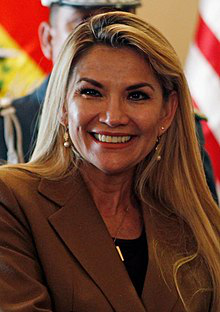

President of Bolivia
13 June 1967 San Joaquín, Beni, Bolivia
-
12 November 2019 – 8 November 2020
66th President of Bolivia In this Spanish name, the first or paternal surname is Áñez and the second or maternal family name is Chávez. Jeanine Áñez Chávez (Spanish pronunciation: ; born 13 June 1967) is a Bolivian politician and lawyer who served as the 66th President of Bolivia on an interim basis from 2019 to 2020. Áñez was previously a senator from the northeastern department of Beni from 2010 to 2019. She was Bolivia's second female president after Lidia Gueiler Tejada. She is a member of Ahora! (Now), branch of the National Unity Front in Beni. Áñez was born to a lower middle-class mestiza family in San Joaquín, Beni. She studied at the Autonomous University of the Beni José Ballivián, obtaining a graduate degree in law and legal sciences. Establishing a career in media, she worked as a presenter and eventually became director of Totalvisión. Moving into politics, she joined the Democrat Social Movement and served as a member of the Constituent Assembly between 2006 and 2008. In 2010, she was elected to the Senate as part of the Plan Progress for Bolivia – National Convergence. As a Senator, much of her work focused on women's rights issues, especially tackling violence against women. Áñez was critical of President Evo Morales's Movement for Socialism (MAS-IPSP) government, for what she perceived as its lack of financial transparency and human rights violations in Bolivia. Following a failed attempt to become Governor of Beni in 2012, she was elected to the role of second vice president of the Senate in 2019. Following the 2019 general election and the ensuing unrest, Morales resigned and went into exile. Áñez was installed as president by a session of the Plurinational Legislative Assembly, the legitimacy of which was opposed by MAS due to its lack of quorum. The Plurinational Constitutional Court ruled that Áñez's appointment was constitutional. Responding to domestic unrest, Áñez issued a decree removing criminal liability for police and military in dealing with protesters; 36 pro-Morales protesters were subsequently killed by security forces. Áñez's government launched investigations into alleged corruption and misdemeanors by MAS politicians, terminated Bolivia's close links with the socialist governments of Cuba, Venezuela, and Nicaragua, and introduced measures to respond to the COVID-19 pandemic. She contested the 2020 general election for JUNTOS (Together), a large right-wing political alliance, but resigned her candidacy one month before the election. MAS candidate Luis Arce won the election and succeeded Áñez as president. In 2021, Áñez was arrested and charged with criminal offences related to the massacres that took place during the first days of her presidency, a move which several international organisations labelled political persecution.

We use cookies
We use cookies and other tracking technologies to improve your browsing experience on our website, to show you personalized content and targeted ads, to analyze our website traffic, and to understand where our visitors are coming from. Privacy Policy.